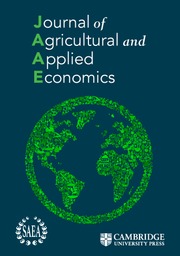Crossref Citations
This article has been cited by the following publications. This list is generated based on data provided by Crossref.
Hudson, Darren
and
Lusk, Jayson
2004.
What You Don't Know Can Cost You: A Web-Based Experiment in Price Discrimination.
Review of Agricultural Economics,
Vol. 26,
Issue. 3,
p.
392.
Johnson, Paul R.
2005.
Conducting a Double Oral Auction Experiment in a High School Computer Lab: A Pilot Study.
SSRN Electronic Journal,
Boyer, Tracy A.
Briggeman, Brian C.
and
Norwood, F. Bailey
2009.
Demand for Multimedia in the Classroom.
Journal of Agricultural and Applied Economics,
Vol. 41,
Issue. 3,
p.
791.
Wilson, Norbert L.W.
and
Nelson, Robert G.
2009.
A Laboratory Science Approach to Teaching in the Agricultural Economics Curriculum.
Review of Agricultural Economics,
Vol. 31,
Issue. 2,
p.
331.


